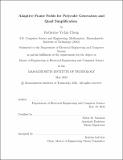Adaptive Frame Fields for Polycube Generation and Quad Simplification
Author(s)
Cheng, Katherine Yi-Lin
DownloadThesis PDF (7.839Mb)
Advisor
Solomon, Justin M.
Terms of use
Metadata
Show full item recordAbstract
Hexahedral (hex) meshing is the problem of approximating a 3-dimensional volume with cube-like structures, and is used to discretize arbitrary volumes to solve PDEs. The structure of a hex mesh is largely guided by its singular graph. For a hex mesh to have good quality, the hexes must have relatively low distortion, and thus relatively simpler singular graphs, as singularities lead to distorted hexes. While frame field-based methods are not guaranteed to produce a hex mesh, they are excellent at simplifying singular graphs. In this thesis, we explore possible solutions to the hexahedral meshing problem based on frame fields.
We gain insight into singularities by adaptively increasing resolution of their frame fields. We show that singularities of octahedral frame fields tend to avoid areas of high resolution, but singularities of odeco frame fields do not. We then use this discovery to help build polycube frame fields by artificially imposing a distorted metric to force singularities towards the boundary. Our approach is able to produce polycube frame fields, but does not solve meshing of certain challenging structures, such as the ramp.
We then apply frame-based ideas towards the 2-dimensional analog of hex mesh simplification: quad mesh simplification. Existing quad mesh simplification methods are not able to output a mesh with a fully simplified singular graph. We combine the ability of frame field optimization to remove complex singularities with the ability of quad mesh simplification to maintain the existence of a quad mesh. More specifically, we use frame field-inspired gradients to produce a candidate ranking algorithm for quadrilateral mesh simplification. We find that we can greatly simplify quad meshes with complicated singularities.
Date issued
2022-05Department
Massachusetts Institute of Technology. Department of Electrical Engineering and Computer SciencePublisher
Massachusetts Institute of Technology